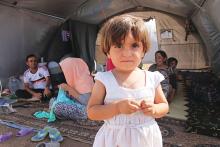Do the images of Syrian refugee children kindle a desire to leave the privileged suburban-dwelling patients in your practice for just a few weeks and donate your clinical skills to help the victims of political conflict? Or, are you looking for a way to give your post-retirement life some meaning by volunteering on a typhoon-ravaged island in Southeast Asia?
Before you ask your partners for a 1-month leave of absence or try to convince your spouse that camping out in a refugee camp would be a better way to spend this year’s travel budget, I urge you to read Pediatricians and Global Health: Opportunities and Considerations for Meaningful Engagement, published in Pediatrics. This lengthy and thorough report by the American Board of Pediatrics Global Health Task Force will give you pause and should serve as an important reality check before you run off to buy the plane tickets for your personal mission of mercy.
Gitanjli Arora, MD, of the Children’s Hospital of Los Angeles, and her coauthors point out that, just because there appears to be a need for people with clinical expertise does not mean that your little black bag of skills honed in the privileged bubble of a first-world country is going to be of much help. This question is one I have pondered on several occasions when I have been offered what might be called “medical voluntourism” opportunities.
If I have distinguished myself as a clinician, that skill has been based on my ability to listen and communicate. Dropped into a community where I have little or no language facility and cultural awareness, I would need to rely on my observational skills. While I pride myself on my ability to make a visual diagnosis, the truth is that my diagnostic successes based solely on observation are almost exclusively dermatologic ones. And, let me add, my familiarity with tropical skin rashes is severely limited. I’m sure I could learn but not in a stay as short as a month.
Taking a history and communicating a treatment plan would force me to rely on the skills of a translator. In settings dominated by upheaval, many of the presenting complaints are going to be the result of, or at least heavily colored by, the chaos induced by anxiety. The ability to sort out where the mind and body connect is difficult enough in a community in which I have spent 40 years and speak the language. Regardless of how much sympathy I feel for the victims of tragic events, my clinical skills would have little value in the short term. Even worse, I would probably just be in the way. As the Task Force points out, my presence could also be squandering local resources as on-site providers worked to get me up to speed.
The authors also explore the numerous other complicating factors that must be considered by those of us who feel the pull to help the victims of global strife and natural disaster. While the authors discourage physicians like you and me from “dropping in” to help, they offer an abundance of suggestions on how we can act globally and stay locally.
Dr. Wilkoff practiced primary care pediatrics in Brunswick, Maine, for nearly 40 years. He has authored several books on behavioral pediatrics, including “How to Say No to Your Toddler.” Email him at pdnews@mdedge.com.



